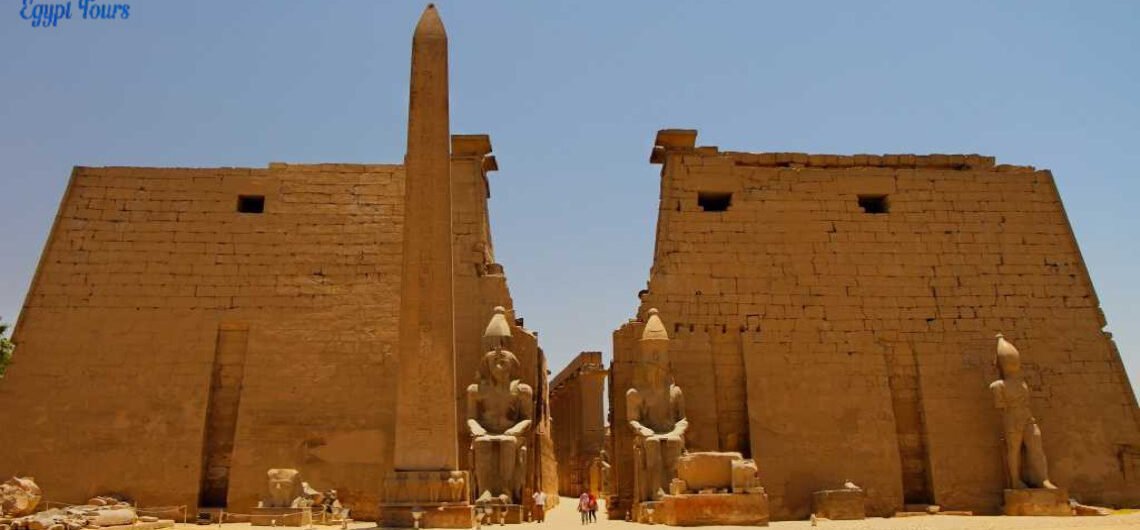Luxor City Attractions, Discover the rich history, culture, and Luxor City attractions, Egypt. From ancient landmarks to modern experiences, uncover everything you need to know.
In this article, we will uncover for you the Luxor City Attractions with Top Ten Egypt Tours.
Introduction About Luxor City Attractions
Nestled along the banks of the Nile River, Luxor City is often referred to as the world’s greatest open-air museum. This city, rich in history and culture, was once the ancient capital of Thebes, and it holds some of the most significant archaeological treasures of ancient Egypt. Luxor is famous for its temples and tombs, including the mesmerizing Karnak Temple and the Valley of the Kings, where pharaohs were laid to rest. The sheer number of monuments and artifacts found in this region has made Luxor a central hub for tourists seeking to immerse themselves in Egypt’s past.
Luxor’s significance in Egypt’s history cannot be overstated. It served as a religious center dedicated to the worship of Amun, a chief deity. Today, it stands as a vibrant city that blends ancient history with modern life, making it a unique destination for travelers. The stunning landscapes along the Nile, coupled with the grandeur of its archaeological sites, create a magical atmosphere that draws visitors from around the globe.
In this guide, we invite you to explore Luxor’s many facets, from its historical significance and top attractions to the rich cultural experiences that await. Whether you are a history buff, an adventure seeker, or a cultural enthusiast, Luxor has something to offer everyone. Join us as we delve into the Luxor Landmarks!

Table of Contents Of Our Luxor City attractions
- Introduction to Luxor City
- Historical Significance
- Top Attractions
- Cultural Experiences
- Modern Luxor City
- Dining and Cuisine
- Shopping Spots
- Outdoor Activities
- Seasonal Travel Tips
- Getting Around the City
- Where to Stay
- FAQs
- Final Thoughts
Section 1: Introduction to Luxor History
Located in Upper Egypt, Luxor City is positioned approximately 670 km south of Cairo, making it one of the most important historical cities globally. The city lies on the east bank of the Nile, opposite the ancient necropolis of Thebes, which is situated on the west bank. Luxor enjoys a hot desert climate characterized by long, scorching summers and mild winters, making it a year-round destination for tourists.
Luxor’s history dates back to the Pharaonic period(Read More), where it served as Thebes, the capital of ancient Egypt during the New Kingdom (1550 – 1070 BC). Its geographical significance as a trade route and a strategic military hub contributed to its development as a cultural and religious center. The modern city retains elements of its ancient past, with many locals still engaged in traditional crafts and trades.
The demographics of Luxor are primarily composed of Egyptians, with a rich tapestry of cultural identities stemming from centuries of history. Among its population, you will find customs and practices passed down through generations, including traditional music, dance, and crafts. This unique blend of ancient heritage and contemporary life contributes to Luxor’s charm and allure.
Unique aspects of Luxor include its breathtaking views of the Nile, the historic architecture that stands as a testament to ancient engineering, and the warm hospitality of its people. Visitors to the city can witness daily life unfolding against the backdrop of iconic temples and tombs, providing an insightful glimpse into both ancient and modern Egyptian life.
Section 2: Historical Significance Of Luxor City attractions
Luxor’s historical significance is deeply intertwined with its ancient roots. The city was known as Thebes in antiquity and played a pivotal role in Egypt’s history, especially during the New Kingdom period. It was during this era that Luxor reached its zenith, becoming not just the political capital but also a religious center devoted to Amun, the sun god. The Karnak Temple Complex, a monumental achievement in architectural design, was constructed as a place of worship and marginalization.
The fertile lands surrounding Luxor supported agriculture, which was crucial for the stability and prosperity of ancient Egypt. The city was a melting pot of culture, commerce, and religion, where trade flourished due to its strategic location along the Nile River. Ancient temples and monuments, such as the Ramesseum and the Colossi of Memnon, are remnants of this rich tapestry of ancient life.
Significant historical events also unfolded in Luxor, particularly during the reigns of some of Egypt’s most notable pharaohs, including Hatshepsut, Akhenaten, and Tutankhamun. The Valley of the Kings, located on the west bank of the Nile, served as the burial site for these pharaohs, housing elaborate tombs adorned with intricate carvings and hieroglyphs. The discovery of Tutankhamun’s tomb by Howard Carter in 1922 is one of the most significant archaeological finds in history, shedding light on the funerary practices and treasures of ancient Egypt.
Today, Luxor’s archaeological sites continue to be a focal point for both historians and tourists. The city has been designated a UNESCO World Heritage Site, highlighting its importance as a preserved cultural heritage location. The treasures of Luxor serve as a bridge connecting the modern world to its ancient past, enabling visitors to experience the grandeur of Egyptian civilization firsthand.
Section 3: Top Aswan City Attractions
Luxor City Attractions showcase the grandeur of ancient Egyptian civilization. Among the most famous sites are:
Karnak Temple: This vast temple complex, dedicated to Amun, is one of the largest religious buildings in the world. Spanning over 200 acres, it features numerous temples, sanctuaries, and statues, all intricately designed with hieroglyphics that tell stories of ancient rituals and the pharaohs who commissioned them. The Hypostyle Hall, with its towering columns and impressive layout, is a must-visit within the complex.
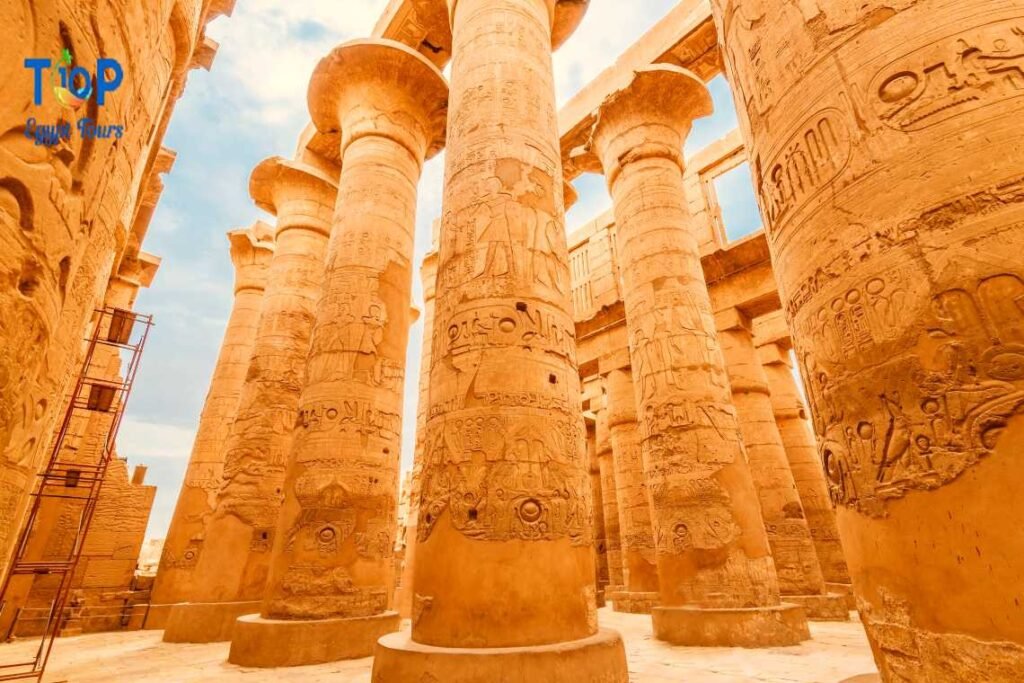
Valley of the Kings: Perhaps the most famous burial ground for pharaohs, the Valley of the Kings is home to over 60 tombs, including that of Tutankhamun. Each tomb is uniquely decorated with scenes from the Book of the Dead and other religious texts, meant to guide the deceased in the afterlife. Visiting these tombs which Considered most important Luxor landmarks allow you to witness the artistry and devotion of ancient Egyptians to their monarchs.
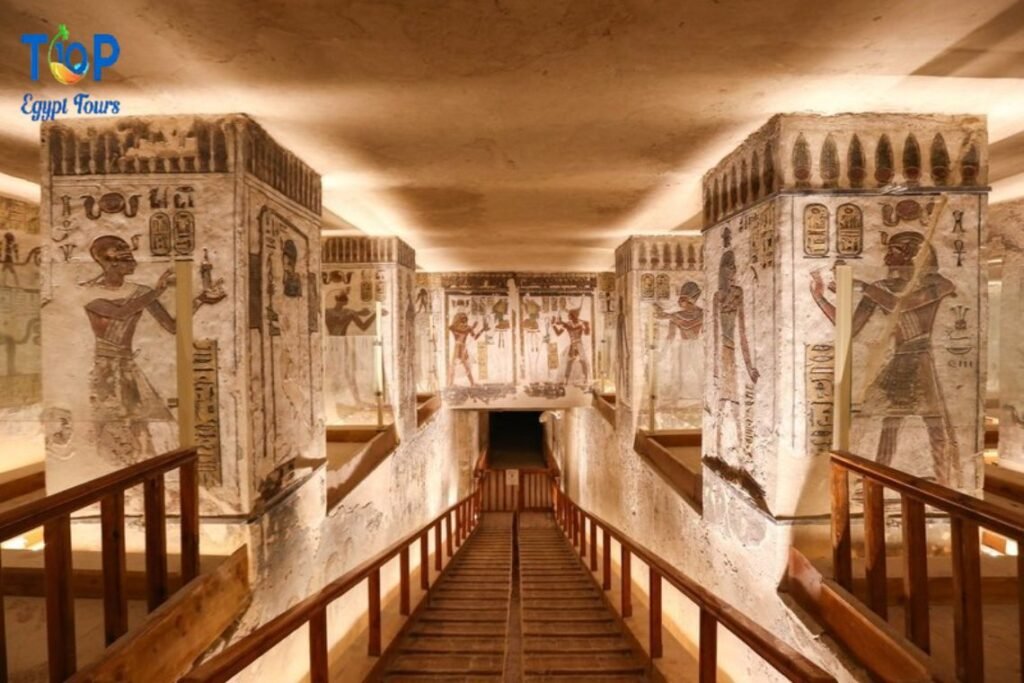
Temple of Hatshepsut: This mortuary temple, dedicated to Queen Hatshepsut, is an architectural marvel. Built into the cliffs of Deir el-Bahari, the temple honors one of Egypt’s few female pharaohs and is decorated with stunning reliefs depicting her divine birth and trade expeditions. Its terraces and colonnades blend harmoniously with the natural landscape, making it one of the most photogenic sites in Luxor.
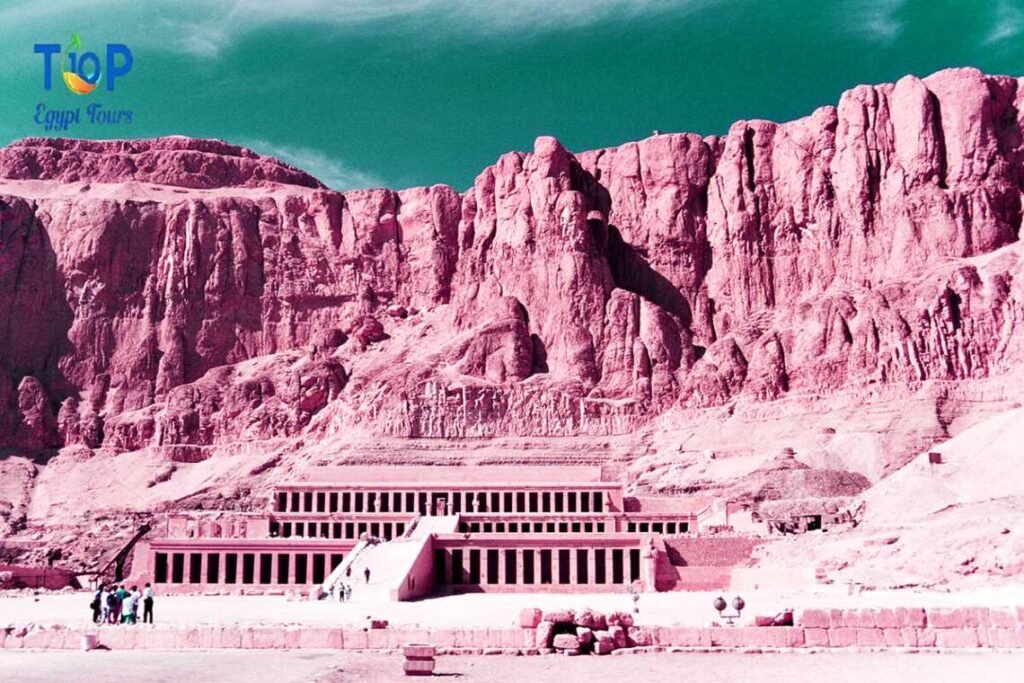
Colossi of Memnon: These gigantic statues stand sentinel at the entrance to the Mortuary Temple of Amenhotep III. Each statue Of Colossi Of Memnon, standing over 18 meters tall, is a symbol of the pharaoh’s legacy and once depicted him in a seated position. Despite their damaged state, they still evoke awe and wonder from all who visit and Considered one of Luxor City Attractions.
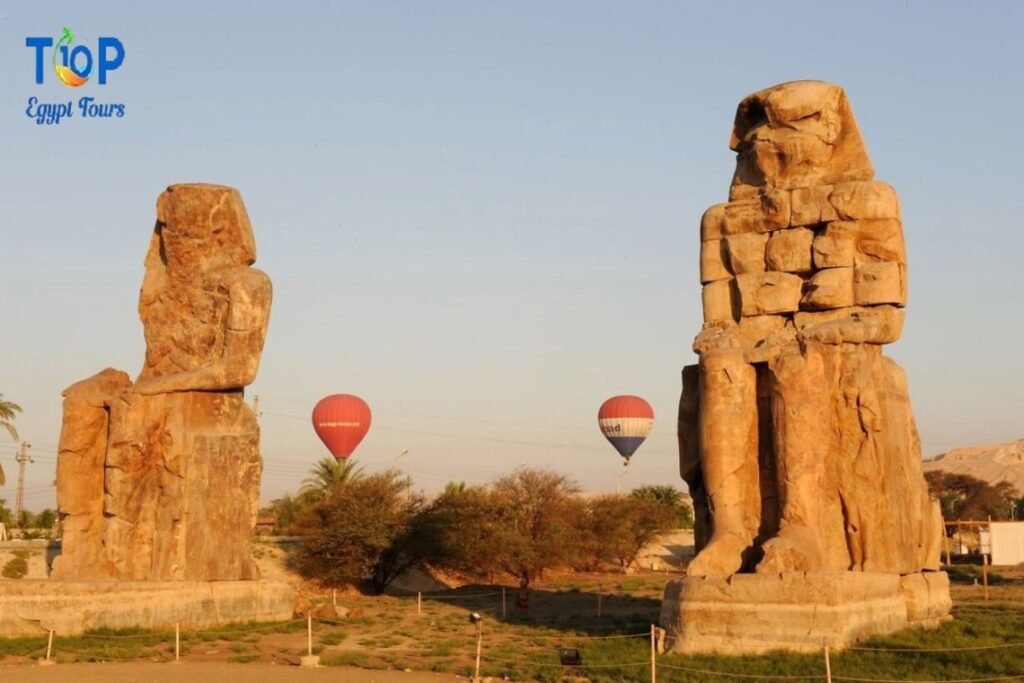
Luxor Temple: Located on the east bank of the Nile, this temple is dedicated to the rejuvenation of kingship, linking the pharaohs to the gods. The magnificent avenue of sphinxes leading to the temple adds to its grandeur. The Luxor temple is especially beautiful at night when illuminated, offering a stunning contrast against the starry sky.
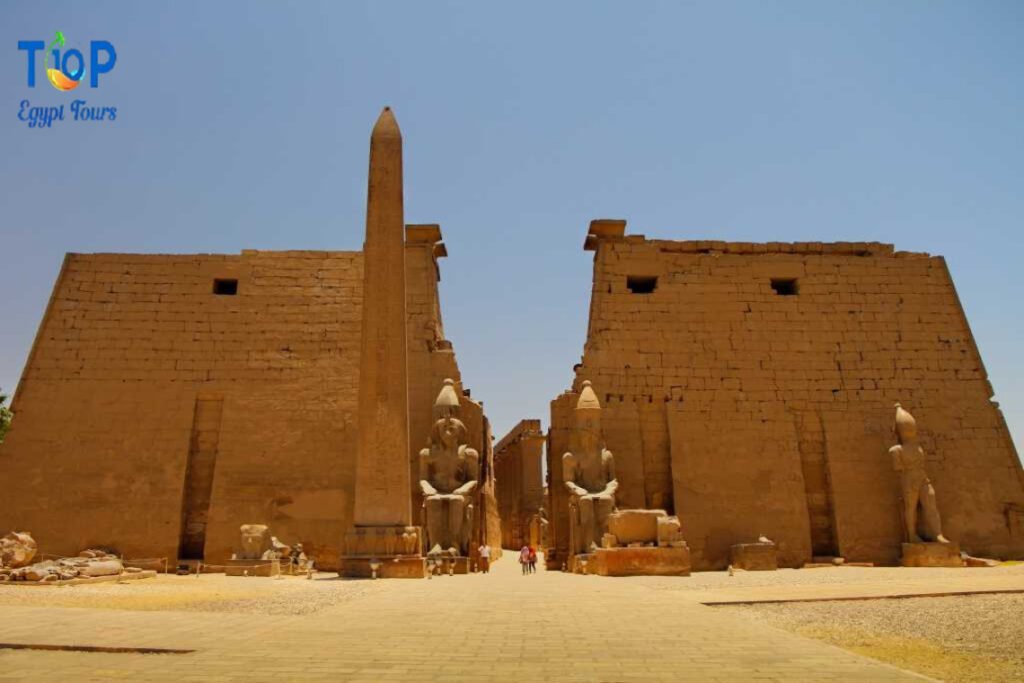
Beyond these well-known sites, Luxor is also home to the Mortuary Temple of Ramses III, the Tomb of Nefertari in the Valley of the Queens, and the Luxor Museum, which showcases artifacts from the area, including priceless items from Tutankhamun’s tomb. Lesser-known attractions provide a more intimate glimpse into ancient life and are often less crowded, offering a serene experience in this historic city.
Section 4: Cultural Experiences
Luxor is not only a hub of ancient history but also a vibrant center for contemporary Egyptian culture. The city comes alive through various festivals, local art, music, and cultural expressions that are steeped in tradition.
Festivals and Celebrations: Luxor hosts several annual festivals that celebrate its rich cultural heritage. One of the most notable is the Luxor African Film Festival, which showcases films from across Africa, promoting cultural exchange and dialogue. The festival features screenings, workshops, and discussions, making it a vital event for filmmakers and cinema enthusiasts.
Music and Dance: Traditional Egyptian music plays a significant role in Luxor’s cultural scene. Visitors can enjoy local performances that feature folk music, often accompanied by traditional dances. The sound of the oud, a stringed instrument, and the rhythmic beats of the darbouka drum create a lively atmosphere in many restaurants and cultural venues. The traditional Tannoura dance is particularly captivating, where dancers spin in colorful skirts, telling stories through their movements.
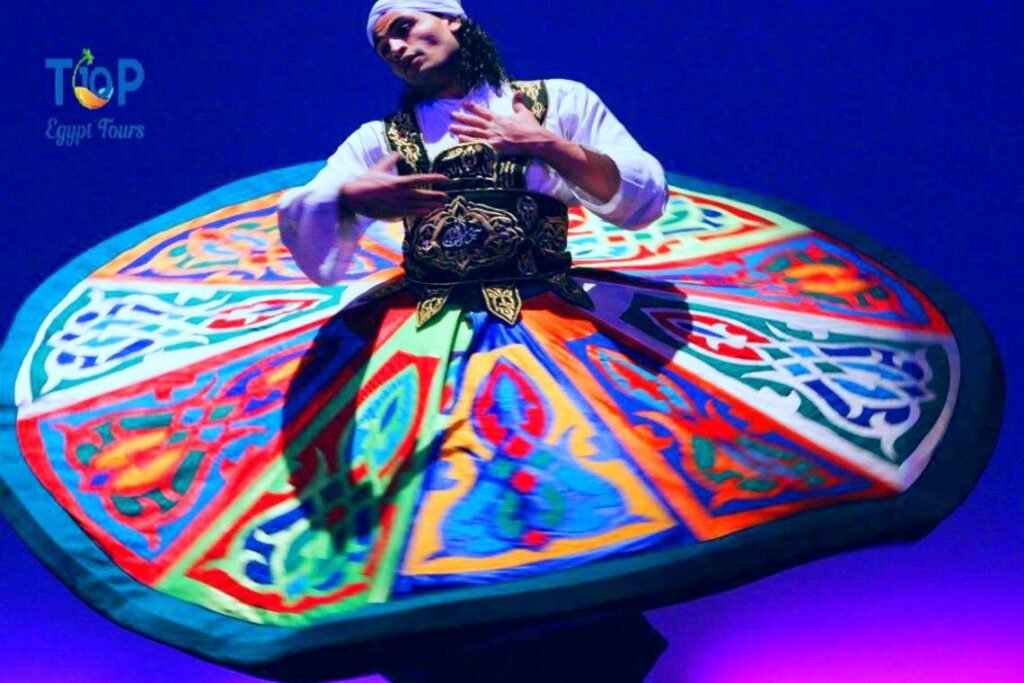
Art and Craftsmanship: Luxor is renowned for its artisans who produce handmade crafts, such as pottery, jewelry, and carpets. The local souks (markets) are a treasure trove for those seeking unique souvenirs. Visiting workshops where artisans create their crafts provides an authentic experience and insight into their skills and techniques.
Culinary Traditions: Culinary experiences in Luxor are an integral part of exploring Egyptian culture. The city offers a range of dining options, from street food stalls serving koshari (a hearty mix of lentils, rice, and pasta) to exquisite restaurants offering traditional dishes. Participating in a cooking class can also be a delightful way to learn about local ingredients and cooking techniques.
Religious and Cultural Landmarks: Luxor is dotted with religious sites that allow visitors to understand the importance of faith in daily life. The temples, mosques, and churches reflect the city’s religious diversity. A visit to the Abu Haggag Mosque, located near Luxor Temple, showcases the blend of Islamic architecture with the surrounding ancient site.
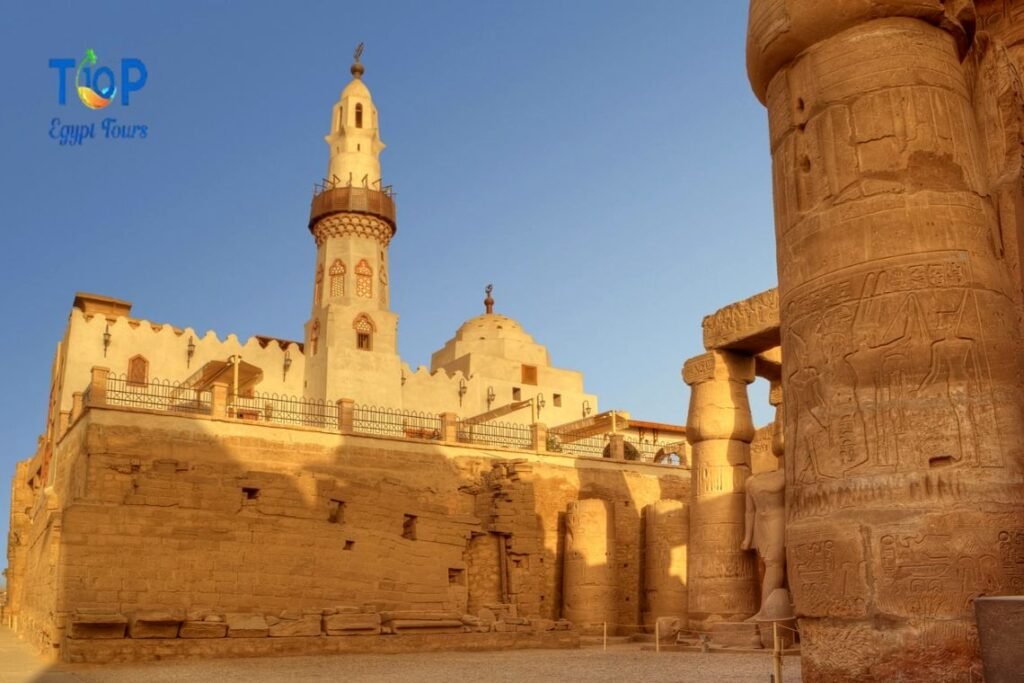
Engaging with the local community also offers a unique perspective on everyday life in Luxor. Programs that promote cultural exchange, such as guided tours that include home visits, enable travelers to meet locals, share meals, and learn about their customs, making for a truly enriching experience.
Section 5: Modern Luxor City
While Luxor is steeped in ancient history, it is also a vibrant modern city that reflects the dynamic evolution of Egyptian society. The city has undergone significant changes, balancing its rich heritage with modern developments.
Urban Development: In recent years, Luxor has seen substantial investments in infrastructure and tourism facilities. Efforts to enhance the visitor experience include the renovation of roads, construction of new hotels, and improved access to archaeological sites. These developments ensure that Luxor remains an attractive destination for tourists seeking comfort alongside cultural immersion.
Economy and Lifestyle: The economy of Luxor primarily relies on tourism, attracting millions of visitors annually. Local businesses thrive off the influx of tourists, with many residents engaged in hospitality, guided tours, and artisanal crafts. The lifestyle in Luxor is a blend of tradition and modernity; while many locals uphold age-old customs, the youth increasingly embrace contemporary influences, reflected in fashion, entertainment, and social norms.
Modern Attractions: Besides its historical sites, modern Luxor offers recreational activities that cater to a range of interests. The Luxor Corniche, a stretch along the Nile River, is perfect for leisurely strolls, featuring cafes, shops, and beautiful views of the water. Outdoor markets brim with vibrant produce, spices, and handicrafts, providing a sensory experience for visitors.
Cultural Institutions: The Luxor Museum serves as a bridge between the past and the present. It houses artifacts from various periods of Egyptian history, including mummies, statues, and everyday items that illustrate life in ancient times. The museum is pivotal for educating both locals and tourists about the significance of their shared heritage.
Community Engagement: Initiatives aimed at promoting local culture and sustainability are gaining momentum. Community-led projects encourage environmental awareness, cultural preservation, and youth engagement in cultural practices. These efforts not only enrich the local fabric but also provide visitors with authentic experiences that go beyond traditional tourism.
Section 6: Dining and Cuisine
Luxor’s culinary scene offers a delightful variety of flavors that reflect the rich cultural tapestry of Egyptian cuisine. From traditional eateries to upscale restaurants, visitors are presented with numerous options to satisfy their palates.
Traditional Dishes: Egyptian cuisine is known for its hearty and flavorful dishes, often based on staple ingredients such as beans, rice, and fresh vegetables. One of the most beloved dishes is koshari, a filling meal made of rice, lentils, and pasta topped with spicy tomato sauce and fried onions. Another must-try is mulukhiyah, a green leafy dish, typically served with chicken or rabbit and accompanied by rice.
Bakeries and Street Food: While exploring Luxor, do not miss out on the local bakeries, where fresh baladi bread is made daily. Street food vendors offer delicious snacks like ta’ameya (Egyptian falafel) and sambousek (savory pastries). Sampling these dishes not only fills your stomach but also connects you with the local culture.

Dining Experiences: Luxor boasts a range of dining experiences that accommodate different tastes and budgets. For a casual meal with a view, try restaurants along the Nile that serve traditional meals while allowing diners to enjoy the stunning river scenery. Upscale dining establishments often blend traditional recipes with modern culinary techniques, presenting dishes in unique and artistic ways.
Food Tours: Joining a food tour can be an excellent way to dive deeper into Luxor’s culinary landscape. These tours typically take you through local markets, introducing you to spices and ingredients while sampling various dishes along the way. Engaging with local chefs and learning secret family recipes enhances your understanding of Egyptian culinary traditions.
Cultural Significance of Food: In Egyptian culture, food is often associated with family gatherings and celebrations. Sharing meals is a central theme in Egyptian hospitality, and visitors will likely be embraced with warmth and generosity. Dining with local families can provide an intimate insight into their customs, allowing for conversations about daily life and traditions.
Section 7: Shopping Spots
Shopping in Luxor offers a unique blend of traditional and modern experiences, making it an exciting adventure for visitors looking to take home a piece of Egyptian culture.
Souks and Markets: The bustling bazaars in Luxor are filled with shops selling everything from spices and textiles to handcrafted goods. Luxor Souk is a highlight, offering a maze of narrow streets lined with vibrant stalls. Here, you can find traditional clothing, jewelry, and souvenirs, often at negotiable prices. Engaging in the haggling process is part of the experience, and many shopkeepers are friendly and willing to share stories about their crafts.
Artisan Workshops: For those interested in unique, handcrafted items, visiting local artisan workshops is a must. Craftspeople in Luxor continue to practice time-honored techniques, producing beautiful pottery, carpets, and jewelry. Buying directly from the artisans not only supports local economies but also provides insight into the craftsmanship that goes into each item.
Modern Shopping Malls: In addition to traditional markets, Luxor features modern shopping venues that cater to various needs. Malls often house international brands, clothing stores, and cafes, providing a contrast to the street market experience. These spaces are popular among locals and tourists alike, offering a comfortable shopping environment with air conditioning, especially during the hot summer months.
Unique Souvenirs: When shopping in Luxor, look for unique souvenirs that reflect the city’s rich history. Items such as replicas of ancient artifacts, papyrus scrolls, and hieroglyphic-themed ornaments make for meaningful gifts and reminders of your journey.
Cultural and Ethical Considerations: While shopping, it’s essential to be respectful of cultural practices. Bargaining is common, but maintaining a friendly demeanor is crucial. Additionally, supporting ethical practices by purchasing from local artisans ensures that your contributions benefit the community directly.
Section 8: Outdoor Activities In Luxor Landmarks
Luxor’s stunning landscapes and rich history create an ideal setting for various outdoor activities that visitors can enjoy.
Nile River Cruises: One of the most popular ways to experience Luxor is by taking a cruise on the Nile River. These cruises can range from short sunset trips to luxurious multi-day sailings. Floating along the river offers breathtaking views of the lush landscapes and ancient monuments lining the banks, providing a serene escape from the hustle and bustle of the city.
Bike Tours: Exploring Luxor by bike is an exciting way to navigate its streets and discover hidden gems. Many local operators offer guided bike tours that take you through rural areas, allowing you to see local life up close and learn about agricultural practices along the fertile Nile banks. This eco-friendly option encourages interaction with locals and helps you appreciate the rich scenery.
Hot Air Balloon Rides: For a truly unforgettable experience, consider taking a hot air balloon ride over Luxor at dawn. As the sun rises, the landscape transforms, revealing an enchanting view of the temples and valleys below. This bird’s-eye perspective offers a unique appreciation for the city’s geographical layout and historical significance.
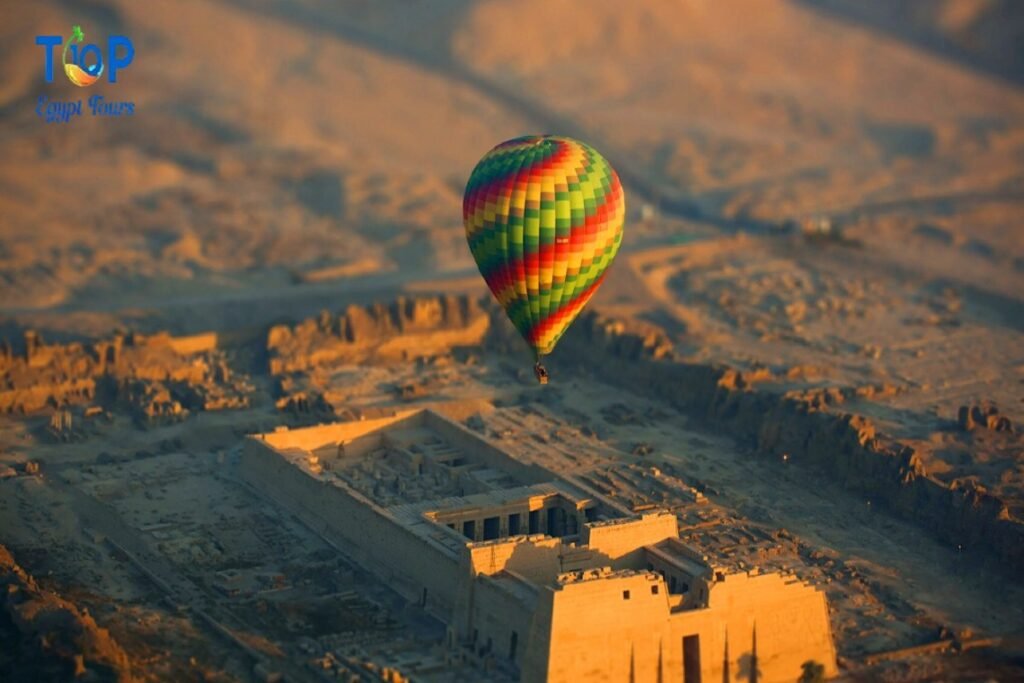
Desert Excursions: Just beyond the River Nile, the majestic desert offers opportunities for adventure. Camel treks or quad biking tours provide adrenaline-filled experiences and a chance to explore the surrounding sand dunes. These excursions often include visits to remote ancient sites, allowing travelers to connect with the untouched beauty of Egypt.
Hiking and Nature Walks: For nature enthusiasts, there are hiking trails in the nearby mountains and valleys. Walking through the beautiful landscapes allows you to spot local wildlife and discover native flora. Guided hikes often include informative talks on the environment and the significance of the area, providing a comprehensive outdoor experience.
Section 9: Seasonal Travel Tips Of Luxor Landmarks
Visiting Luxor can be enjoyable year-round, but understanding the seasonal climate can help you plan your trip effectively.
Best Times to Visit: The ideal time to visit Luxor City attractions is during the cooler months, typically from October to April. During this period, temperatures are more manageable, ranging from 15°C (59°F) at night to 25°C (77°F) during the day. This is also the peak tourist season, so be prepared for larger crowds at major attractions.
Summer Heat: From June to September, Luxor experiences scorching heat, with daytime temperatures often exceeding 40°C (104°F). If you plan to visit during these months, prioritize early morning or late afternoon excursions and stay hydrated. Many locals suggest exploring indoor attractions during the hottest parts of the day, such as museums or visiting cafes.
Cultural Considerations: Travelers should be aware of cultural practices and local customs throughout the year. For example, Ramadan, the holy month of fasting, influences daily life significantly. While visitors are not required to observe the fast, it’s respectful to be mindful of the locals’ practices during this time.
Packing Suggestions: Regardless of the season, lightweight and breathable clothing is essential to stay comfortable in Luxor’s heat. Sunscreen, a wide-brimmed hat, and sunglasses are also crucial for sun protection. For cooler evenings, especially in winter months, a light jacket is advisable. Don’t forget comfortable walking shoes, as exploring the sites often involves considerable walking.
Tips for Planning: Consider booking accommodations in advance during the peak season to secure the best options. Additionally, planning guided tours can enhance your experience, providing context and knowledge about the sites you visit. Checking local calendars for festivals or events during your visit can also enrich your travels, offering unique cultural experiences.
Section 10: Getting Around the Luxor City Attractions
Navigating Luxor is relatively straightforward, with various transportation options available to suit different preferences.
Public Transportation: Luxor has a functional public bus system that connects various parts of the city, offering an affordable way to travel. However, buses can be infrequent and crowded, so they may be more suitable for adventurous travelers.
Taxis and Ride-Sharing: Taxis are widely available throughout Luxor. It’s advisable to agree on a fare before starting your journey, as many taxis don’t have meters. Alternatively, ride-sharing apps can be a convenient option, providing a more modern and comfortable way to get around the city.
Bicycles and Walking: A bike rental service can be a fun way to explore Luxor at your own pace. The flat terrain makes cycling pleasant, and there are many scenic routes along the Nile. Walking is also a viable option, especially within the city center and around the temple complexes. This allows for more spontaneous exploration and the opportunity to discover hidden gems.
Tour Operators: Many tourists opt for organized tours that include transportation to the major historical sites. This can be particularly useful for visiting locations that are farther apart, such as the Valley of the Kings and Karnak Temple. Guided tours often provide valuable context and historical background, enriching the overall experience.
Safety Tips: While Luxor is generally safe for tourists, it’s always wise to exercise caution, especially when using public transport. Keep an eye on your belongings, avoid displaying valuables, and remain aware of your surroundings. When walking, stick to well-lit areas and avoid empty streets after dark.
Section 11: Where to Stay
Luxor offers a wide range of accommodations that cater to different budgets and preferences, from luxury hotels to budget-friendly guesthouses.
Luxury Hotels: For a lavish experience, Luxor boasts several high-end hotels that provide stunning views of the Nile and immediate access to cultural attractions. These hotels often offer amenities such as swimming pools, fine dining, and spa services, perfect for those looking to relax after a day of exploring.
Mid-Range Accommodations: There are numerous mid-range hotels and boutique establishments that provide comfortable stays without breaking the bank. Many of these properties are family-run, offering a personalized touch and insights into local culture. Locations in the city center are advantageous for walking to nearby attractions.
Budget-Friendly Options: Budget travelers will find various guesthouses and hostels in Luxor that offer affordable rates. These accommodations often provide basic amenities and a communal atmosphere, allowing travelers to meet others. Staying in these places can also lead to more authentic local experiences and recommendations.
Unique Stays: For those seeking something different, consider staying on a falucca, a traditional Egyptian sailboat. Some operators offer overnight stays that include meals and tours of nearby sites. This experience allows for a truly special connection with the Nile and the surrounding scenery.
Proximity to Attractions: When choosing accommodation, consider proximity to major attractions. Staying near the Nile or city center allows easy access to historical sites, local restaurants, and shops. Many hotels also provide shuttle services to popular destinations, making travel convenient for guests.
Booking Tips: Reservations are advisable, especially during peak tourist seasons. Check for deals or packages that may include guided tours or meals. Reading reviews on travel platforms can also help you find the best fit for your needs and preferences.
Section 12: FAQs Luxor City attractions Tour
Q1: What is the best time to visit Luxor City attractions?
The ideal time to visit Luxor is from October to April when temperatures are more comfortable for sightseeing. During the summer, temperatures can be extremely high.
Q2: Is Luxor safe for tourists?
Yes, Luxor is generally safe for tourists. However, like any destination, it is advisable to take standard precautions, such as avoiding poorly lit areas at night and keeping an eye on personal belongings.
Q3: How do I get from Luxor to the Valley of the Kings?
Transportation options include organized tours, taxis, or renting a bicycle for a more adventurous approach. Many hotels offer shuttle services to major attractions.
Q4: What currency is used in Luxor?
The currency in Egypt is the Egyptian pound (EGP). Credit cards are widely accepted at hotels and larger restaurants, but it’s good to carry cash for smaller vendors and markets.
Q5: Do I need to book tours in advance?
While many tours can be arranged on arrival, booking in advance during peak tourist seasons is recommended to secure spots for popular attractions.
Section 13: Final Thoughts Of Luxor Landmarks
Luxor City is a captivating destination rich in history, culture, and adventure. Its stunning archaeological treasures, vibrant contemporary life, and welcoming atmosphere make it an essential part of any Egyptian itinerary. From exploring the awe-inspiring temples and tombs to immersing yourself in local traditions and culinary delights, Luxor offers an unparalleled experience that resonates with every visitor.
As you plan your journey, remember that Luxor is more than just a collection of ancient sites; it is a living city that connects the past with the present. Embrace the opportunity to engage with the local community, savor the flavors of traditional cuisine, and explore the magnificent landscapes along the Nile.
We encourage you to plan your visit to Luxor Landmarks and delve into the wonders that await you. Whether you’re captivated by its historical significance, enthralled by its cultural experiences, or simply absorbed in its natural beauty, Luxor promises memories that will last a lifetime. Start your adventure today, and uncover the Luxor City Attractions!
Discover More Excursions And Activities in Luxor

